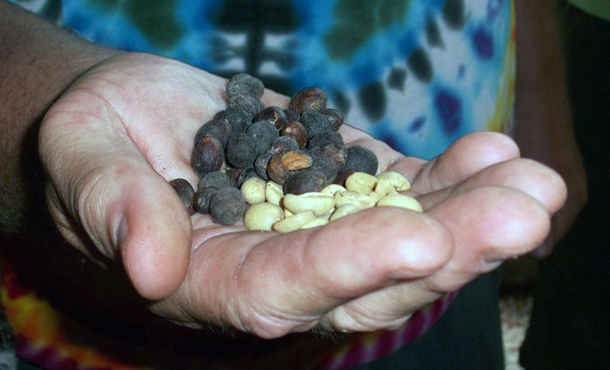We chose “Crossing Borders, Building Connections” as the overarching theme of our semester of study at the U.S./Mexico border and in Guatemala this past spring semester. Eastern Mennonite University requires all of our graduates to engage in cross-cultural immersion as part of our CORE curriculum. We invite our own faculty to teach and accompany our students each semester. We chose to partner with Frontera de Cristo because of their multi-dimensional work and strong faith-based educational immersion program.
One of the most heated issues in the Shenandoah Valley of Virginia where we live is the debate surrounding policies and attitudes towards immigrants, undocumented workers, and the crossing of national borders. We wanted to focus on our connectedness as human beings and explore the resources of Christian faith in how to welcome the stranger in our midst. Many of our local neighbors here in Harrisonburg have come from Mexico and Central America to work in our poultry plants, landscaping, construction and the service sector. We see them in our classrooms, grocery stores, at soccer games and in our churches and we struggle to know how best to welcome them and how to engage the many faith, policy, human rights and economic implications of immigration.
Frontera de Cristo provided us with many meaningful conversations, visits, and experiences which pushed us to move beyond an “us” versus “them” construct, to a “we are all in this together” and how can WE as U.S. citizens take responsibility for OUR wall, the violence, the deaths, the flow of people, the grief, and desperate need for reconciliation and peace. What part will we play in the transformation of our borderlands?
“Learning on the ground” in a community with 20 EMU students best fits our teaching pedagogy. We encourage written reflection, struggle, and deep personal and spiritual wrestling with the questions we encounter. But this struggle isn’t just for our students. We found ourselves fully engaged in thinking, rethinking, discerning and asking God for insight about the complexity of our borders and the policies and varied interests that compete for attention. As Anabaptists with a strong peace position, we often found ourselves asking “What would it take or look like to “secure a peace accord” here at our very own border?”
Frontera de Cristo’s ministries and connections on both sides of the border as well as their relationships with those who are often in conflict with one another was a most encouraging sign for us. As a group, we moved back and forth across the border about eight different times. The land itself has no natural barrier. We were often struck by the division the wall itself artificially imposes on the landscape. And we were challenged to reflect on the Ephesians passage which affirms that Christ has broken down the dividing walls between peoples.
Moving from one side to the other hearing stories of those who have been hurt and wounded by policy and police, then hearing the policymaker and border patrol agent talk about their own fears and concern for security reminded us that we have so much more in common in our deepest hearts desires. We all long for economic security, safety for our children, educational opportunities and relationships that transcend language, ethnicity, race. Yet we live in a world where boundaries separate and create deep divides. The words to the song, O Healing River come to mind as we consider the border area…
O healing river, send down your waters
Send down your waters upon this land
O healing river, send down your waters
And wash the blood from off the sand
This land is parching, this land is burning
No seed is growing in the barren ground
O healing river, send down your waters
O healing river, send your waters down.
Our initial ten days of the semester we were hosted by Frontera de Cristo in Aqua Prieta and Douglas, and there could not have been a better way to begin our semester. We heard about the many sides of border challenges and realized that for every issue there is a human face, a family, a community, a congregation who grieves and rejoices as news travels from both sides of the U.S./Mexico border. We were especially moved by the vigil that occurs every Tuesday evening in Douglas naming those who have died in the surrounding county. Having spent four years in El Salvador after the civil war, we know the importance of closure and having some remains to bury for a family. This vigil reminded us that dignity can be shared through ritual and that grief can be carried by the gathered community, for those named and for those whose bodies were no identificado, unidentifiable. Silence filled our debriefing as tears filled our eyes…how do we work together for a border where no one is left alone to die in the desert? How do we promote a world where families do not feel forced to take great risks in order to survive?
And for the final 10 days of our semester of learning we were hosted by families (socios) in Salvador Urbina, Chiapas. We stayed in family homes, tried many new foods, hiked through coffee plots of cooperative members, learned the complex process of preparing coffee beans for roasting, and gained a much deeper knowledge of the economics of coffee growing and production. A cup of coffee will never look the same after this experience. Walking up the steep mountainsides and watching all the work it takes to care for one plant of coffee makes us value the growers within the cooperative, Café Justo, and their careful work that brings us a robust, strong, flavorful cup of coffee.
The Spirit of God’s work for love and justice flows like water,
Like never-ending streams:
Comforting the wounded;
Calling those who have wounded to repentance;
Challenging traditions which are rigid and violent;
Envisioning new relationships where every voice is heard.
O Healing River, send down your waters!
–Women’s Inter-church Council of Canada
